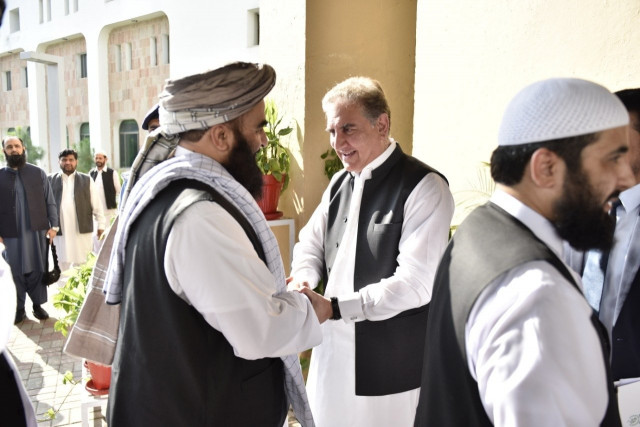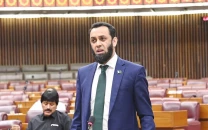Pakistan, Afghan Taliban call for US to resume peace talks
Khalilzad, Taliban may meet in Islamabad

Afghan Taliban delegation at the FO. PHOTO: RADIO PAKISTAN
The delegation-level talks between the Taliban led by Mullah Abdul Ghani Baradar and the Pakistani leadership rekindled hopes for the revival of peace process, which was called off last month by US President Donald Trump over the killing of an American soldier in Kabul.
Following the Taliban delegation's meeting with Foreign Minister Shah Mehmood Qureshi and ISI head Lt Gen Faiz Hameed, it emerged that the visiting leaders of the insurgents group would meet US Special Envoy Zalmay Khalilzad, who is also in the federal capital.
It is not clear if the meeting between the Taliban delegation and US chief negotiator Ambassador Khalilzad would be the formal resumption of stalled peace talks.
Nevertheless, the development is seen as significant and a step towards finding a political solution to the 18-year long Afghan war.
On September 9, President Trump dropped a bombshell when he revealed that he was all set to host the Taliban leaders at Camp David to push for a peace deal.
He; however, cancelled the meeting as well as pulled out of the peace talks, citing the Taliban's continued attacks targeting the American forces.
Observers, however, felt that the real reason behind cancellation of the talks was to push the Taliban to agree on a ceasefire or at least reduce the level of violence in the war-torn country.
The peace deal negotiated by Khalilzad after painstaking talks in Doha was seen by some in the US as a document of surrender.
Against this backdrop, the meeting between the Taliban delegation and Foreign Minister Qureshi, who was also accompanied by the ISI director-general and other officials, focused on how to revive the peace process.
A handout issued by the Foreign Office said both the sides agreed on the need for the resumption of peace talks at the earliest, suggesting that the Taliban are ready to meet the US officials.
Another takeaway of the meeting was Pakistan's emphasise on all parties to reduce the level of violence in order to create an enabling environment to restart the stalled peace process.
Although the official statement did not explicitly mention the Taliban, it is clear that the message seeking reduction of violence was for the insurgent group.
The US has been pushing the Taliban to agree on a ceasefire and enter into an intra-Afghan dialogue. The group has so far resisted those two demands, saying such issues would be taken care of once the deal is signed with the US.
Official sources say Pakistan is trying to convince the Taliban to at least give a commitment to reduce the level of violence -- if not comprehensive ceasefire at this stage.
The Taliban delegation and the US special envoy are scheduled to stay in Pakistan for few days. There were reports that the Taliban delegation also met Prime Minister Imran Khan. But the Prime Minister Office denied it.
According to the official handout, the foreign minister noted that while the people of both Afghanistan and Pakistan have a shared history, geography and culture, Islam remains the strongest bond between the two brotherly countries.
He added that the people of both countries had also suffered tremendously due to the 40-year-long conflict and instability in Afghanistan. It was time to make all possible efforts for an early, peaceful resolution of the conflict in Afghanistan.
Qureshi added that Pakistan would continue to support all efforts to achieve permanent peace in Afghanistan which was essential for Pakistan's own socio-economic development and progress.
He added that Pakistan had wholeheartedly supported Afghanistan in its difficult times during the past four decades. In line with the teachings of Islam and as part of its moral obligation as a friendly neighbour.
"Pakistan has hosted millions of Afghan brothers and sisters during this period. All these years Pakistan has also kept reminding the world not to overlook the hardcore political, economic, socio-cultural and ethnic ground realities in Afghanistan and its immediate neighborhood," he said.
Qureshi said Pakistan had maintained for several years that there was no military solution to the complex situation in Afghanistan. An inclusive peace and reconciliation process, involving all sections of the Afghan society was the only practical way forward.
The foreign minister further noted that the direct Taliban-US talks since last year, strongly and sincerely supported by Pakistan, had now laid a firm ground for achieving a sustainable peace deal in Afghanistan.
"A pacific settlement of the conflict would lead to a significant reduction of violence, end of bloodshed and long-term peace, stability and prosperity for future generations of Afghanistan," he stressed.
While appreciating the Taliban's serious engagement in the peace process, he underscored the need to take the efforts to their logical conclusion.
He noted that the existing, broad regional and international consensus for achieving peace in Afghanistan at the earliest provided an unprecedented opportunity that must not be lost.
It was up to the parties to the conflict in Afghanistan to grasp this opportunity. Qureshi expressed the hope that the currently paused peace process would be restarted at an early date.
Thanking Pakistan for the hospitality, the Taliban delegation appreciated Pakistan's support for peace in Afghanistan.
Both sides agreed on the need for earliest resumption of the peace process.
The foreign minister reiterated Pakistan's commitment and continued strong support for all efforts in this regard.
It was emphasised that reduction of violence by all parties to the conflict was necessary to provide an enabling environment for resumption of the peace process at an early date.



















COMMENTS
Comments are moderated and generally will be posted if they are on-topic and not abusive.
For more information, please see our Comments FAQ